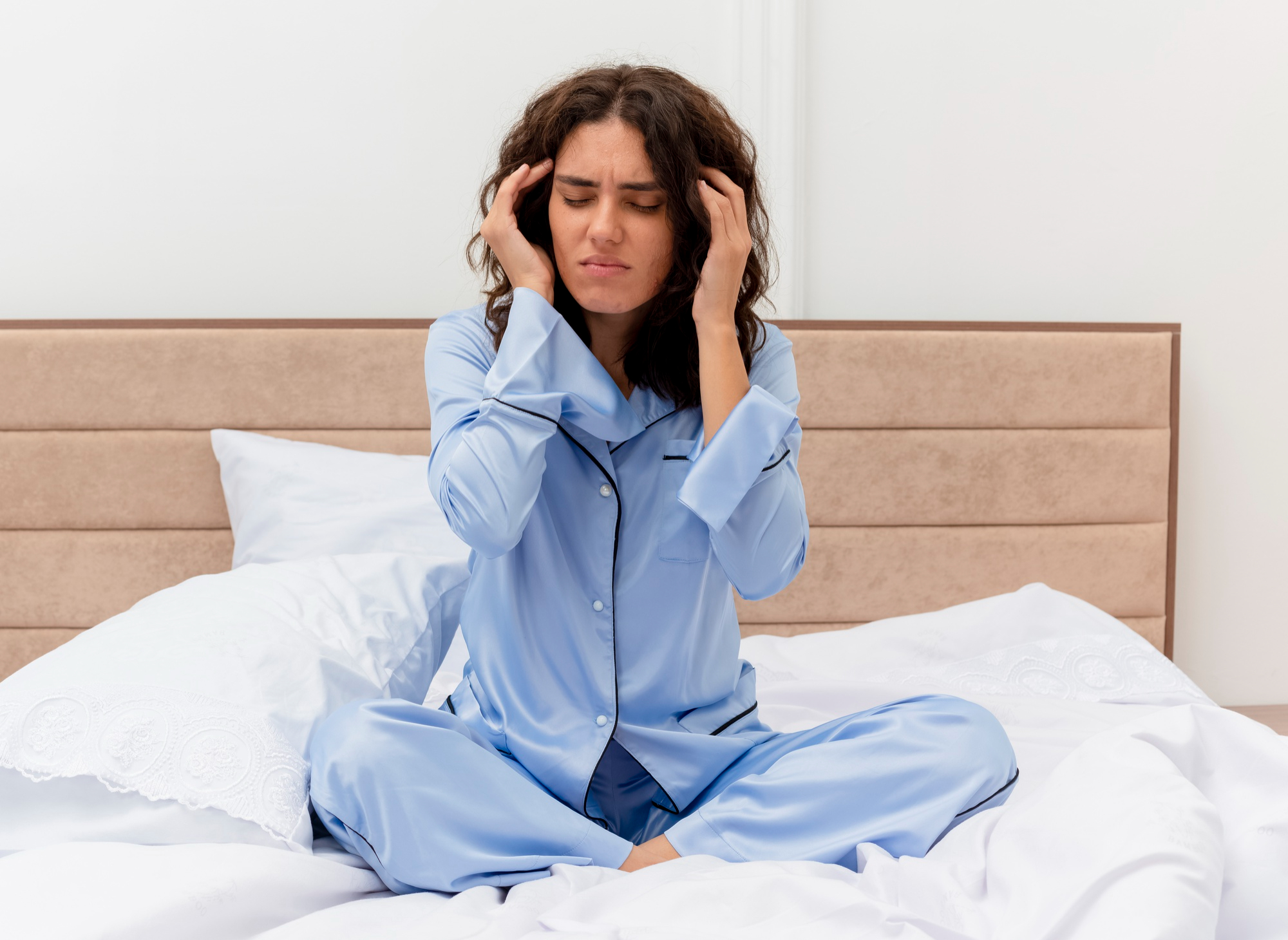Here, we are sharing information on the topic “how to sleep better with anxiety.” Before going to bed, a person with sleep anxiety may have a pattern of uneasy, tense, and worried thoughts. Sleep anxiety is a subtype of performance anxiety. Your brain can find it difficult to stay active at night, which leads it to turn to any worried feelings or ideas, even though there are countless activities to keep your cognitive functions occupied throughout the day.
- An incessant cycle of tension and restless nights can result from anxiety. If you frequently have anxiety at night, it could be difficult to distinguish between the two: whether you’re nervous because you can’t sleep or you’re anxious because you can’t sleep.
- Studies show a correlation between anxiety and sleep. Anxiety can interfere with sleep and make it harder to fall asleep, but anxiety can also be brought on by sleep deprivation. You could fear going to bed and waking up even more sleep deprived if you’re having trouble falling asleep.
- Researchers from UC Berkeley propose that sleep deprivation can activate brain regions that cause excessive concern, which in turn causes additional anxiety and makes sleep even more elusive.

What Indicates Nighttime Anxiety Symptoms?
Because everyone experiences anxiety at night differently, there are many different ways that it might manifest itself. The pediatrician and medical consultant for Mom Loves Best, Dr. Pierrette Mimi Poinsett, states that anxiety before bed is similar to anxiety during the day. The distinction is that since there are fewer other cues present at night, you might be more conscious of your uneasiness.
Although each person experiences sleep anxiety differently, the following are some of the most typical symptoms:
- Having trouble getting to sleep or staying asleep
- difficulty focusing
- sensations of anxiety and restlessness
- digestive issues
- Both night terrors and nightmares
- A hypnotic jerk (twitching)
how to sleep better with anxiety
Panic episodes are a symptom of sleep anxiety. This is a terrifying event that can happen either before or during sleep and is marked by a sensation of impending doom, an elevated heart rate, perspiration, lightheadedness, dyspnea, and a detached feeling. It can be difficult to fall asleep after a panic attack at night because of concern about having another one.
1. Put Your Concerns on Paper: Put your worries and fears on paper.
- Writing down your ideas can “help us remain accountable to ourselves, our feelings, our goal, and our plan,” according to Juanita Wells, director of clinical development at New Method Wellness.
- Put ideas and tasks on paper so your mind has a plan for the next day, rather than letting them float around in your head. According to Wells, journaling in a stream-of-consciousness style—that is, writing down whatever comes to mind—can be a useful tool for relieving tension before bed.
- A study reveals that journaling might not only reduce anxiety before bed but also accelerate your sleep.
- Simply curl up with your notebook and some comfortable cushions to begin journaling, then let your thoughts take over.
2. Steer clear of stressful pursuits Limit television before bedtime
The founder of Transformative Mindset and certified psychotherapist Amber Weiss states, “It is strongly important to create some sort of transition from daylight to sleeping.” Weiss contends that it is unrealistic to expect the mind to fall asleep on its own. Rather, you must give your brain enough time to adjust, just like we do when we leave the house or go outside.
3. Set Aside Time for Relaxation Establish a time for relaxing.
- Dr. Fran Walfish, a family and relationship psychologist, advises “developing a routine that winds you down and gets you in the mood for sleep” if you’ve been having trouble falling asleep. This can involve doing things like taking a warm bath, turning down the lights, or listening to relaxing music.
- Additionally, Walfish advises against watching TV or using a computer or other screen because doing so can “tend to rev up anxiety and excitatory thresholds versus relax and calm you down.” Instead, she encourages engaging in light reading.
- The ideal nightly routine gives your body and mind enough time to relax before turning out the lights. Give yourself at least thirty minutes to read a book, listen to a podcast, take a bath, or play some relaxing music. These “transition rituals” have the power to rewire your brain to link specific behaviors to getting ready for bed.
4. Work out before going to bed
- Lawson adds that since exercise lowers the release of stress chemicals, it can help soothe anxiousness before bed. People who exercise regularly report being able to fall asleep more quickly and soundly. For people who suffer from chronic insomnia, even a moderate-intensity exercise like a brisk walk can help with sleep.
- Exercise can be a terrific method to maintain healthy sleep habits, but as Harvard Men’s Health Watch editor in chief Dr. Howard LeWine states, “You should avoid strenuous activity for at least one hour before bedtime.” You might want to forgo the late-night sweat session and instead choose a morning or afternoon workout if you’ve been having trouble falling asleep.
5. Before going to bed, practice meditation
- Dr. Clara Lawson, a medical professional from the USA, claims that meditating before bed can reduce anxiety. Furthermore, studies have demonstrated that practicing diaphragmatic breathing relaxation techniques can significantly lower anxiety levels prior to going to bed.
- Begin with only a few minutes of peaceful sitting while paying attention to your breathing. Stress management during the day and before bed can be facilitated by learning to meditate and quiet your mind. To help your body get ready for sleep, try these calming yoga positions if you have difficulties meditating.
6. Adopt Good Sleep Practices: Adopt good sleep practices
To help you sleep better, licensed psychologist Dr. Nikki Lacherza-Drew, owner of Vici Psychological Care, advises practicing good sleep hygiene. “If you have a pattern and consistently practice good sleep hygiene, your mind will be less prone to go into a rabbit hole of worrisome thoughts,” explains Lacherza-Drew.
The term “sleep hygiene” describes a number of behaviors that are essential for restful sleep. In order to maintain proper sleep hygiene, Lacherza-Drew recommends the following:
- reducing the amount of time spent on screens before bed
- Avoid vigorous exercise and large meals right before bed.
- Avoid caffeine and alcohol close to bedtime or after a specific afternoon hour.

Conclusion
(how to sleep better with anxiety)
In conclusion, controlling anxiety to enhance the quality of sleep necessitates a complex strategy that takes into account the environment around sleep as well as the underlying worry. The aforementioned tactics—which include developing a regular sleep schedule, setting up a calm environment before bed, managing stress and anxiety with mindfulness and relaxation techniques, limiting exposure to stimulating activities before bed, and getting professional assistance when necessary—offer doable approaches to fostering better sleep even in the face of anxiety. People can improve their capacity to de-stress, unwind, and get restorative sleep by making self-care a priority and regularly putting these tactics into practice. This will ultimately improve their general well-being and quality of life. Recall that treating anxiety and enhancing sleep quality frequently go hand in hand, so don’t be afraid to take proactive measures to improve your mental and physical health and sleep hygiene.
Frequently asked questions
(how to sleep better with anxiety)
Why is anxiety worse at night?
Answer: The absence of daytime distractions when lying in bed can cause people to focus more on their anxieties, which can exacerbate anxiety. For instance, people who suffer from insomnia occasionally start to worry about their ability to fall asleep.
Can I sleep away anxiety?
Answer: Anxiety and Sleep | Foundation for Sleep
Getting more sleep may help fight anxiety because of the complex interplay between anxiety and sleep. Developing regular sleep patterns and healthy sleep habits might improve the enjoyment of going to bed.
Why is my anxiety so bad?
Answer: Excessive anxiety can be brought on by a major incident or an accumulation of minor stressful life situations. Examples include a death in the family, stress at work, or persistent worry about money. Personality. Anxiety disorders are more common in some personality types than in others.
What triggers anxiety at night?
Answer: Factors related to lifestyle: Sleep anxiety can be brought on by bad habits including excessive screen time, coffee drinking, or irregular sleep schedules. underlying medical conditions: Anxiety at night can be brought on by diseases including neurological illnesses, breathing issues, or persistent pain.
So, this is how the topic “how to sleep better with anxiety” has been addressed.
- For more information related to these topics, click here.
- You may also visit our Instagram page by clicking here.
- You may also visit our YouTube channel by clicking here
Thank you for visiting our site.






